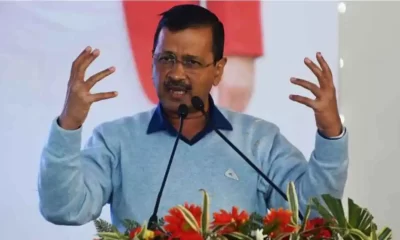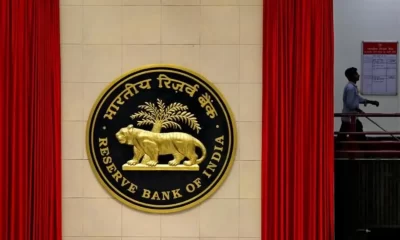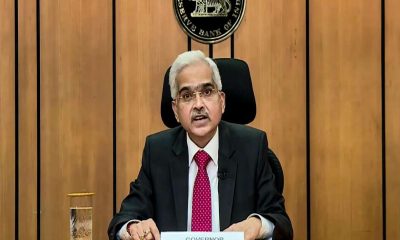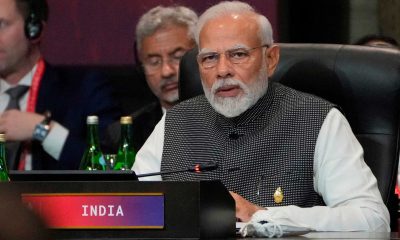Latest business news
RBI opens UPI payments to tourists from G20 nations
Foreign tourists from G20 nations can now shop or make payments in India using the Unified Payments Interface (UPI), the Reserve Bank of India (RBI) announced on Wednesday.

Foreign tourists from G20 nations can now shop or make payments in India using the Unified Payments Interface (UPI), the Reserve Bank of India (RBI) announced on Wednesday.
In a statement, RBI chief Shaktikanta Das announced that visitors from G-20 countries will now have access to make UPI payments, but only those arriving at certain airports.
India assumed the presidency of G20 for one year from December 1, 2022 to 30 November, 2023. The G20 group comprises of Argentina, Australia, Brazil, Canada, China, France, Germany, India, Indonesia, Italy, Japan, the Republic of Korea, Mexico, Russia, Saudi Arabia, South Africa, Turkey, the UK, the US, and the European Union (EU).
Das, while unveiling the latest monetary policy, said the UPI system, which has become highly popular for retail digital payments across the country, will now be opened to travellers coming into India for making merchant payments (P2M) while they are in the country, adding that the facility will initially be available only to visitors from G20 countries arriving at select international airports, but will eventually be extended to all tourists during their stay in India.
UPI has become a wildly popular mode of payment during the past six years with transactions reaching a record high of Rs 12.82 lakh crore in December 2022.
In January, the government announced UPI access to Non-Resident Indians (NRIs) having international mobile numbers linked to their NRE/NRO accounts. Indians overseas will be able to make UPI payments by April 30.
NRIs in Singapore, US, Australia, Canada, Hong Kong, Oman, Qatar, Saudi Arabia, UAE and UK- can access UPI services without having to depend on their India phone number.
Additionally, accounts like NRE/NRO (Non Resident External and Non-resident Ordinary) with international mobile numbers can use UPI for transactions.
Railways cancel 326 trains, 86 other partially cancelled on February 8, check full list here
Journalist beaten to death by catering staff over serving hot food in Kanpur, video viral | Watch
Latest business news
Google restores delisted Indian apps after government intervention
Google on Saturday restored all Indian apps it had removed.

Google has started to restore all the delisted Indian mobile apps on Play Store agian, which they had removed due to a disagreement over service fees. After a discussion between company representatives and IT Minister Ashwini Vaishnaw, the decision was made, according to sources.
The step was taken in response to Vaishnaw’s strong statement in which he said that it is not allowed for apps to be removed from the Google Play Store. The minister had said, India is very clear, our policy is very clear…our startups will get the protection that they need.
Vaishnaw continued saying that he has already given Google a call. They will be speaking with the app developers who were delisted this week. This is not acceptable. The minister said this kind of delisting cannot be permitted.
Ten Indian companies’ apps were banned by Google on Friday, causing outrage in one of its fastest-growing markets. With 94% of phones running on its Android platform, Google holds a large portion of the Indian market. Popular names like Naukri and Bharatmatrimony were on the list.
The main point of contention is Google’s in-app purchase fees, which range from 11% to 26%. Indian startups have long opposed the US tech giant’s actions, believing them to be unfair.
The founder of Bharat Matrimony, Christian Matrimony, Muslim Matrimony, and Jodii, Matrimony.com, expressed shock at the matchmaking apps’ removal from the Google Play Store.
Shaadi. Com CEO Anupam Mittal described it as a dark day for India’s internet, highlighting the possible broad effects on matchmaking services. He also called Google an evil.
While, Kuku FM Co-founder Vinod Kumar Meena in a statement had said that Google was behaving like a monopoly.
Meanwhile, Google temporarily withdrew the famous Indian payments app Paytm from the Play Store in 2020, claiming a few policy infractions. Due to this decision, the founder of the company as well as the larger startup community came together to build their own app stores and file lawsuits against Google.
Latest business news
Anant Ambani says he is 100% lucky to get Radhika Merchant in his life
Anant Ambani said he was grateful to get Radhika as his life partner. He said he is 100% lucky to get Radhika Merchant in his life. He said every day he is falling more and more in love with her. He added although he had known Radhika for the last 7 years, it felt he had met her only yesterday. He thanked Radhika for everything.

Anant Ambani and Radhika Merchant’s grand three-day wedding celebrations began with a glamorous cocktail night on Friday in Jamnagar. During the celebrations, Anant Ambani also gave a speech wherein he thanked his late grandfather Dhirubhai Ambani and grandmother Kokilaben Ambani for inspiring him. Anant Ambani said he was grateful to get Radhika as his life partner. He said he is 100% lucky to get Radhika Merchant in his life. He said every day he is falling more and more in love with her.
He expressed his gratitude to his mother for pulling together the lavish three-day wedding celebrations in Jamnagar. Anant thanked his mother for all she had done. He said all the arrangements had been done by his mother and nobody else. He added his mother had gone all out and she had worked 18-19 hours a day and he was extremely grateful to her.
He also thanked all the guests who were present there at the pre-wedding celebrations. He said everyone had made it to Jamnagar to make him and Radhika feel special. He said both of them were honored and humbled to have all of them present there. Anant said he was sorry if they had caused an inconvenience to anyone. He asked for forgiveness. He hoped everyone is going to enjoy the coming three days. He also thanked his mother, father, sister, brother, his sister-law and his brother in-law for making this event memorable.
Anant said everyone has been sleeping for less than 3 hours a day for the last 2-3 months and he was very happy to share this joy with everyone. The youngest Ambani talked about his personal struggles and how his parents had always supported him. He further added his life had not been entirely a bed of roses. He said he had also experienced the pain of thorns. He said he had faced many health crises.
Latest business news
Facebook chief Mark Zuckerberg shares pictures from 2nd day of Anant Ambani and Radhika Merchant pre-wedding celebrations
Zuckerberg shared pictures from the 2nd day of Anant Ambani and Radhika Merchant’s pre-wedding celebrations. In the photograph Mark Zuckerberg can be seen along with his wife Priscilla Chan. The couple is exuding happiness as they prepare for the event. He captioned the picture it is getting wild out here.

Facebook boss Mark Zuckerberg and wife Priscilla Chan joined the star- studded pre-wedding celebrations of Anant Ambani and Radhika Merchant in Jamnagar on Friday. The event was attended by many prominent figures from different fields. Zuckerberg took to his Instagram handle congratulated the couple and said he loved Indian weddings.
Zuckerberg shared pictures from the 2nd day of Anant Ambani and Radhika Merchant’s pre-wedding celebrations. In the photograph Mark Zuckerberg can be seen along with his wife Priscilla Chan. The couple is exuding happiness as they prepare for the event. He captioned the picture it is getting wild out here.
The theme of the opening day of the pre-wedding celebrations was Evening in Everland as the guests wore cocktail attire. The first day of the grand celebrations elevated the expectations of the guests for the following days. The theme of the 2nd day of the pre-wedding bash is known as a Walk on the Wildside and the guests can be seen in Jungle Fever attire.
Zuckerberg has opted for an animal print shirt with white trousers, Chan is complementing his look in a strappy one piece in black and golden. The Jungle theme is aligned to Vantara, Reliance’s animal welfare initiative undertaken and launched by Anant Ambani a few days back.
International pop star Rihana electrified the pre wedding celebrations on Friday with an amazing performance, marking her debut appearance in India. The chart topping artist engaged the audience with performances of her iconic hits which included Pour it Up, Work and Diamonds.
Zuckerberg graced the opening day, wearing a black-on-black firefly blazer and shoes from Alexander McQueen while his wife Priscilla wore a black gown with gold flower details and other accessories such as dainty chain bracelet, gold necklace and stud earrings. Mark Zuckerberg and wife Priscilla Chan are one of the Power couples invited from the global business community for the festivities currently underway at Jamnagar.
-

 Entertainment14 hours ago
Entertainment14 hours agoBollywood stars Vidya Balan, Kartik Aaryan, Pratik Gandhi, Ileana D’Cruz, Mouni Roy, Radhika Madan, Mrunal Thakur attend Do Aur Do Pyaar premiere
-

 LATEST SPORTS NEWS18 hours ago
LATEST SPORTS NEWS18 hours agoIPL 2024: Delhi Capitals thrash Gujarat Titans by 6 wickets
-

 Cricket news12 hours ago
Cricket news12 hours agoHappy Birthday KL Rahul: Suniel Shetty wishes son-in-law KL Rahul on his 32nd birthday
-

 India News16 hours ago
India News16 hours agoReligious outfit vandalises The Blessed Mother Teresa High School in Telangana after teachers object to students wearing Hanuman Deeksha dress
-

 India News17 hours ago
India News17 hours agoClashes erupt during Ram Navami procession in West Bengal’s Murshidabad district
-

 India News11 hours ago
India News11 hours agoEnforcement Directorate seizes Shilpa Shetty’s husband Raj Kundra’s properties worth Rs 97 crore
-

 India News10 hours ago
India News10 hours agoEnforcement Directorate says Arvind Kejriwal is deliberately eating mangoes, sweets, taking sugar with tea to increase his blood sugar level and create ground for bail













